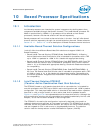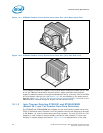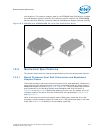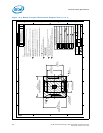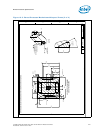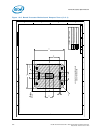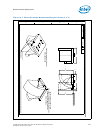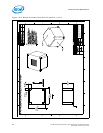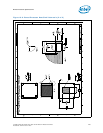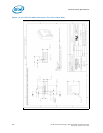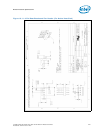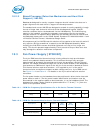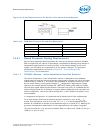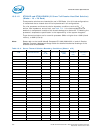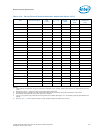
Boxed Processor Specifications
228 Intel® Xeon® Processor E5-1600 v2/E5-2600 v2 Product Families
Datasheet Volume One of Two
10.2.2 Boxed Processor Retention Mechanism and Heat Sink
Support (ILM-RS)
Baseboards designed for use by a system integrator should include holes that are in
proper alignment with each other to support the boxed processor.
The standard and narrow ILM-RSs are designed to extend air-cooling capability through
the use of larger heat sinks with minimal airflow blockage and bypass. ILM-RS
retention transfers load to the baseboard via the ILM Assembly. The ILM-RS spring,
captive in the heatsink, provides the necessary compressive load for the thermal
interface material. For specific design details on the standard and narrow ILM-RS and
the Backplate please refer to the
Intel® Xeon® Processor E5-1600/2600/4600 v1 and
v2 Product Families Thermal / Mechanical Design Guide.
All components of the ILM-RS heat sink solution will be captive to the heat sink and will
only require a Phillips screwdriver to attach to the ILM Backplate Assembly. When
installing the ILM-RS the screws should be tightened until they will no longer turn
easily. This should represent approximately 8 inch-pounds of torque. More than that
may damage the retention mechanism components.
10.3 Fan Power Supply [STS200C]
The 4-pin PWM controlled thermal solution is being offered to help provide better
control over pedestal chassis acoustics. This is achieved through more accurate
measurement of processor die temperature through the processor’s Digital Thermal
Sensors. Fan RPM is modulated through the use of an ASIC located on the baseboard
that sends out a PWM control signal to the 4th pin of the connector labeled as Control.
This thermal solution requires a constant +12 V supplied to pin 2 of the active
thermal solution and does not support variable voltage control or 3-pin PWM control.
See Figure 10-12 and Table 10-1 for details on the 4-pin active heat sink solution
connectors.
The fan power header on the baseboard must be positioned to allow the fan heat sink
power cable to reach it. The fan power header identification and location must be
documented in the suppliers platform documentation, or on the baseboard itself. The
baseboard fan power header should be positioned within 177.8 mm [7 in.] from the
center of the processor socket.
Table 10-1. PWM Fan Frequency Specifications For 4-Pin Active Thermal Solution
Description Min Frequency Nominal Frequency Max Frequency Unit
PWM Control Frequency
Range
21,000 25,000 28,000 Hz
Table 10-2. PWM Fan Characteristics for Active Thermal Solution
Description Min Typical
Max
Steady
Max
Startup
Unit
+12V: 12-Volt Supply 10.8 12 12 13.2 V
IC: Fan Current Draw N/A 1.25 1.5 2.2 A
Sense Pulse Frequency 2
Pulses per fan
revolution



